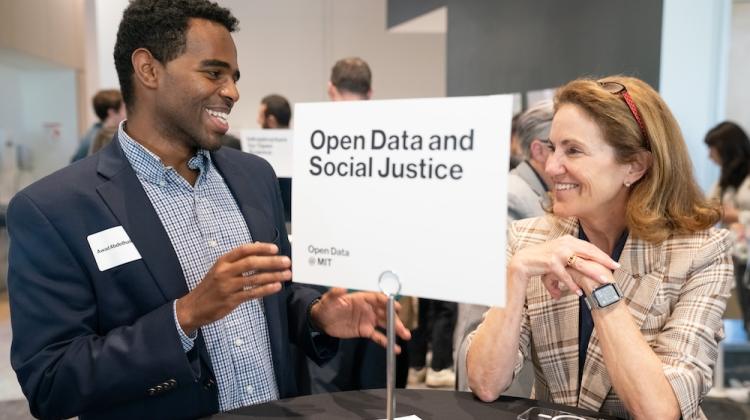Third Annual MIT Prize for Open Data Celebrates Researchers Across MIT

Image credit: Bryce Vickmark via MIT Libraries
The third annual MIT Prize for Open Data, which included a $2,500 cash prize, was recently awarded to 10 individual and group research projects. Presented jointly by the School of Science and the MIT Libraries, the prize highlights the value of open data — research data that is openly accessible and reusable — at the Institute. The prize winners and 9 honorable mention recipients were honored at the Open Data @ MIT event held Oct. 22 at Hayden Library.
The prize program was launched in 2022, spearheaded by Chris Bourg, director of MIT Libraries, and Rebecca Saxe, associate dean of the School of Science and the John W. Jarve (1978) Professor of Brain and Cognitive Sciences. It recognizes MIT-affiliated researchers who use or share open data, create infrastructure for open data sharing, or theorize about open data. Nominations were solicited from across the Institute, with a focus on trainees: undergraduate and graduate students, postdocs, and research staff.
“This year, we noted a number of submissions touching on strategic priorities for MIT, like artificial intelligence,” said Bourg. “President Sally Kornbluth has spoken repeatedly about MIT’s special responsibility to contain its risks and harness its power for good. One way to do that is to focus on improving the openness and transparency of the data that underpins AI models and tools, and we were pleased to see so many projects focused on that critical issue. There were also a number of projects that relate in some way to climate change, democracy, and human health.”
The 2024 awards were presented at a celebratory event held during International Open Access Week. Winners gave five-minute presentations on their projects and the role that open data plays in their research. The program also included remarks from Bourg and Nergis Mavalvala, dean of the School of Science and Curtis (1963) and Kathleen Marble Professor of Astrophysics. Mavalvala remarked how, in her own field of research, detecting gravitational waves, “instruments collect terabytes of data in the blink of an eye,” and open data drives this research forward. “People who make data usable by others are not celebrated enough,” she said.
Winners were chosen from more than 70 nominees, representing 25 different departments, labs, and centers across the Institute. A committee composed of faculty, staff, and graduate students made the selections.
Winners included Awad Abdelhalim, assistant director of research for the Urban Mobility and Transit Labs, won for the KhartouMap Initiative, along with collaborators Ilham Ali and Abubakr Ziedan. The KhartouMap Initiative is a Sudanese youth-led initiative catalyzing the modernization of Sudan’s public transit through mapping, open data, education, and innovation, KhartouMap is the first to fully map Khartoum’s semi-formal public transit system and provide open data on transit routes, usage, and opportunities for improvement.


